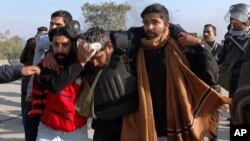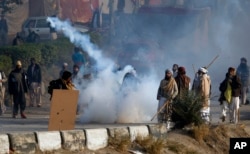Pakistani police using tear gas and water canon fought running battles with stone-throwing Islamist activists, as they moved to clear a sit-in by the religious hard-liners who have blocked the main routes into the capital of Islamabad for more than two weeks.
The protests have spread to other main cities, including Karachi, Lahore, Rawalpindi and Peshawar.
The clashes began Saturday when police launched an operation involving about 4,000 officers to disperse around 1,000 activists from Tehreek-e-Labaik, a new hard-line Islamist political party, and break up their camp, police official Saood Tirmizi told Reuters.
Dozens of protesters were arrested, Tirmizi said, and hospitals reported dozens of people were being treated for injuries.
Religious right’s strength
The mass protest, plus the recent gains of two new Islamist parties in Pakistan, demonstrated the religious right’s gathering strength ahead of what are expected to be tumultuous elections next year.
Television footage showed a police vehicle on fire, heavy curtains of smoke and fires burning in the streets as officers in heavy riot gear advanced. Protesters, some wearing gas masks, fought back in scattered battles across empty highways and surrounding neighborhoods.
“We are in our thousands. We will not leave. We will fight until end,” Tehreek-e-Labaik party spokesman Ejaz Ashrafi told Reuters by telephone from the scene.
By midday, TV coverage had been cut off and private channels were off the air by orders of the official media regulator.
Daily life shut down
The protesters have paralyzed daily life in the capital, and have defied court orders to disband, demanding the firing of the minister of law.
Tehreek-e-Labaik blames the minister, Zahid Hamid, for changes to an electoral oath that it says amounts to blasphemy.
The government puts the issue down to a clerical error.
“Death to blasphemers” is a central rallying cry for Tehreek-e-Laibak, which was born out of a protest movement lionizing Mumtaz Qadri, a bodyguard of the governor of Punjab province who gunned down his boss in 2011 over his call to reform strict blasphemy laws.
The party, which advocates strict rule by Islamic Sharia law, won a surprisingly strong 7.6 percent of the vote in a by-election in Peshawar last month.
Negotiations failed
Since Tehreek-e-Labaik began its sit-in, the government has blocked several roads with shipping containers to corral the protesters, but that caused hours-long traffic jams in and around the capital.
The government had tried to negotiate an end to the sit-in, fearing violence during a crackdown similar to 2007, when clashes between authorities and supporters of a radical Islamabad mosque led to the deaths of more than 100 people.
Support for protest
By late morning, Tehreek-e-Labaik supporters were coming out on the streets in other Pakistani cities in support of the Islamabad protesters.
About 500 demonstrators blocked several main roads in Karachi, the southern port that is Pakistan’s largest city, a Reuters witness said. Police fired tear gas to try to disperse them from a main road near Karachi’s airport.
In the eastern city of Lahore, party supporters blocked three roads into the city, provincial government spokesman Malik Ahmad Khan said.
“We want them to disperse peacefully. Otherwise we have other options open,” he said. “We don’t want to use force, but we will if there is no other option left.”
In Islamabad, police official Aftab Ahmad said officers were using restraint and denied media reports that rubber bullets were being fired.
However, Labaik spokesman Ashrafi said “several of our workers have got rubber bullet injuries” and also asserted police had fired live rounds, which police denied.






